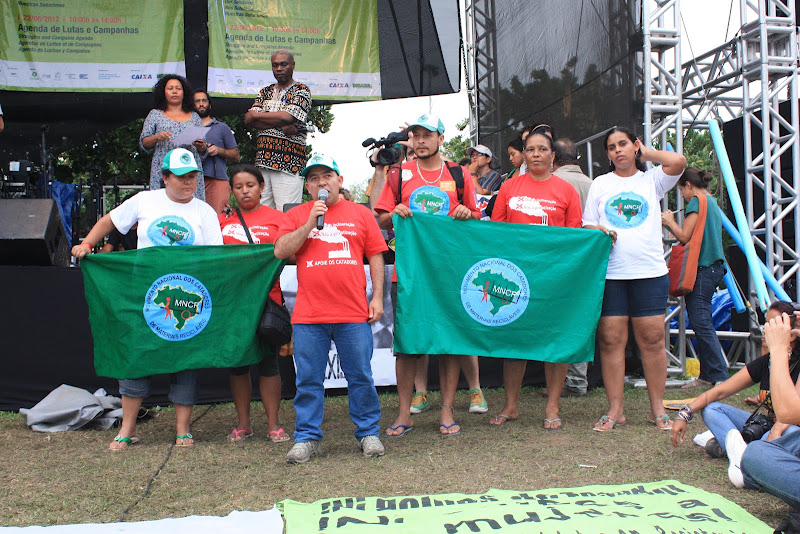June 26, 2012
June 18, 2012
Movimento Nacional dos Catadores de Materiais Recicláveis, MNCR
Red Latinoamericana y del Caribe de Recicladores, REDLACRE
Global Alliance for Incineration Alternatives, GAIA
We face the Rio +20 Conference with deep concerns about the state of the formal United Nations negotiations and the policies that are being promoted by governments on environmental matters, specifically in the area of waste. At the same time, we see hope for the advancement of just and sustainable alternatives promoted by communities, social movements, and the recyclers of the world.
Today, the Rio +20 Conference has produced a text which recognizes the importance of taking into account the life cycles of products, and the need to develop policies for greater energy efficiency and waste management systems that prioritize reduction, reuse and recycling. But the text also supports energy recovery from waste, which is a phrase that typically refers to the implementation of end of pipe technologies such as incinerators or landfills (point 220, text from June 16 at 5.45 pm, Rio de Janeiro).
These technologies are incompatible with sustainable waste management systems, because they are not rooted in an economic model that values resource conservation and the welfare of communities. Also, the production of energy from waste is a false solution, because more energy is conserved through recycling and reduced use of toxics and poor quality materials.
As waste pickers and community organizations concerned about human and environmental health, we demand the adoption of a text with a vision of promoting policies that prioritize local solutions and create sustainable jobs for the community, instead of favoring large corporations through false technological solutions such as waste burial and incineration. Support for incinerators and end of pipe solutions in general, through subsidies, carbon trading, and other similar mechanisms, only promotes the use of technologies that are expensive, inefficient and highly dangerous to human health.
The future we want is a future free of incinerators and landfills, a future in which we give back what we ask from nature, and where communities and waste pickers are invested with responsibility for this task.
With Support from:
- Salud sin Daño
- Amigos de la Tierra El Salvador (CESTA)
- Women International for a Common Future (WICF)
- Amigos da Terra Àfrica do Sul (groundWork)
- IPEN – um futuro livre de tóxicos
- Sistema de Agua Potable de Tecámac, Estado de México, A.C.
- APROMAC – Associação de Proteção ao Meio Ambiente de Cianorte,
- TOXISPHERA – Associação de Saúde Ambiental
- AMAR – Associação de Defesa do Meio Ambiente de Araucária
- CAPA (Centro de Atención Primaria Ambiental) de Marcos Juárez, Córdoba
- CAT , COMITE AMBIENTAL DE TONACATEPEQUE El Salvador,
- Ciudad Saludable (Perú),
- Ecositio (Argentina),
- Consultoría Técnica Comunitaria AC (México)
- BIOS (Argentina)
- Movimiento Avance Santo Domingo (Costa Rica),
- Taller de Comunicación Ambiental (Argentina),
- Gibsons Recycling, British Columbia, Canada
- DurhamCLEAR, Canada
- Durham Environment Watch (DEW), Canada
- Biomass Accountability Project, USA
- East Michigan Environmental Action Council (EMEAC), USA
- JA! Justiça Ambiental – Friends of the Earth Mozambique
- Institute for Zero Waste in Africa, South Africa (IZWA)
- Earthlife Africa Cape Town, South Africa
- Communities Against Toxics UK
- Mother Earth Foundation – Philippines
- Marie Marciano, Saniblakas ng mga Aktibong Lingkod ng Inang Kalikasan – Philippines
- Sanjay K Gupta (Ph D), Advisor and Consultant in Water, Sanitation and Livelihood, New Delhi – India
- Grassroots Recycling Network, USA
- Eco-Accord, Russia
- Zero Waste Italy Network
- Center for Environmental Solutions (CES), Belarus
- Susan Hubbard, President & CEO, Nothing Left to Waste
- Eureka Recycling, USA
- International Indian Treaty Council, USA
- Bruce Trask, Director, Zero Waste Education, New Zealand
- Consultoría Técnica Comunitaria AC – Chihuahua, México
- Biofuelwatch
- Ecological Alert and Recovery-Thailand (EARTH)
- National Toxics Network, Australia
- Armenian Women for Health and Healthy Environment, Armenia
Tweet


